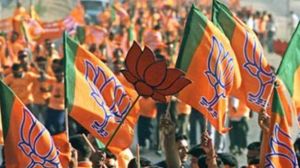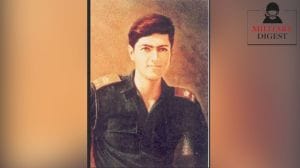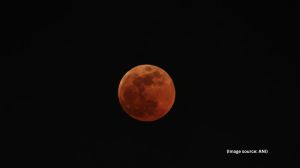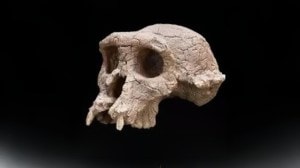A French cul de sac?
Forty per cent of the voters are uncertain. And there are at least three unhappy vote banks. This year, no French presidential candidate has a clear agenda

Spitting out statistics, opinion poll companies are enjoying their revenue while more than 40 per cent of the French electorate is undecided. With twelve candidates in the first round fray on April 22, and two first round finalists for the second round on May 6, 2007, the presidential election is still a green-field area.
Seasoned politicians fished in deep-water upto the 1995 presidential election. This year, with no clear agenda save French identity, every candidate is casting away on the surface for fish in running water. The fishing lines are criss-crossing each other, creating a cul de sac.
President Charles de Gaulle represented the French bourgeois legacy from 1962 to 1969. President Georges Pompidou modernised French tradition from 1970 until his sudden death in 1974. President Valery Giscard d8217; Estaing was a technocrat, while the shrewd President Francois Mitterand masterminded politics from 1981 to 1995 as though, 8220;You either want to be right or you want to be president.8221; He reduced working time to 35-hours a week. In fact, France was the world8217;s first country to give paid holidays, and in 1936, Leon Blum8217;s Communist government reduced working hours from 58 to 42 hours.
After twenty marathon years of being a failed presidential candidature, from 1974 to 1995, Jacques Chirac displayed perseverance and survival cowboy instincts before becoming president in 1995. He is slated to retire on May 22, 2007. Old-fashioned, aristocratic Elyseacute;e Palace president house will be starkly different here onwards. Major contenders Nicolas Sarkozy, Segolene Royal and Francois Bayrou are 8216;baby8217; candidates, although Jean Marie le Pen is a doyen.
The extreme Right grew strong from 1988 when the Communists fell out with Mitterand and gave their votes to le Pen8217;s protesting political party. In 2002 le Pen even challenged Jacques Chirac in the second round. For the first time in France, people voted against a candidate, that is le Pen and his extreme Right politics, instead of in favour of one. Chirac enjoyed a landslide victory with 82 per cent votes solely in order to prevent Le Pen from coming to power.
Opinion polls got busy since Royal declared her candidature in October 2006. She polled 52 per cent with Nicolas Sarkozy polling 48 per cent for the second round. Her score improved once the Socialist party officially nominated her, but has now reversed with Sarkozy at 52 per cent. The first round speculation is Sarkozy, 30 per cent, Royal, 22 per cent, Bayrou, 19 per cent and le Pen, 13 per cent.
No candidate has any globalisation agenda, all their issues are short term, hexagon centric France is geographically six sided, antibiotic remedies to win over undecided voters. Law, order and immigration continue to be le Pen8217;s focus. Sarkozy has proposed changing the criminal procedure for youngsters and requiring newcomers to embrace secular republican values. Royal says unruly youth be sent to centres under military discipline.
Seacute;golene Royal is using le Pen8217;s tactics, asking the French to fly their flag, and sing the Marseillaise at party meetings. She8217;s visiting nightclubs to woo youth support. But historic French institutions find it difficult to fit a woman presidential candidate into the chauvinistic system. Her candidature has added bhelpuri masala in the French election this year.
Nicolas Sarkozy, a French child of Hungarian immigrants, is defending his right Republican party by talking about security from hooligan immigrants. Playing the 8216;man of the country8217; card, he too is shouting out le Pen8217;s politics of 8216;French first, Immigrants out8217; as using Mitterand8217;s 1981 campaign theme of 8216;tranquil force.8217;
Francois Bayrou, a Centrist candidate polling just 7 per cent in the first round on October 26 has suddenly gone up to 19 per cent on April 5. A quiet third man after Sarkozy and Royal, his 6 8216;e8217;s programme of employment, ecology, education, economy, exclusion and Europe is beginning to attract the masses.
Opinion poll ratings for 79-year-old le Pen markedly increased after the 2005 riots involving unruly immigrant youth. Also, scandals have trailed politicians including former Prime Minister Alain Juppe, who was convicted. The Clearstream affair exposed forgery of politicians from the ruling UMP coalition of which Sarkozy is the candidate. Both he and Royal are facing a tough time about using influence to buy property.
Aside from 40 per cent voter uncertainty, there are clearly three unhappy vote banks. These are the 10 million minimum basic salary SMIC earners struggling due to the high cost of living, the 10 per cent unemployed and the 6.5 million North African immigrants.
Francois Mitterand stunned people when he took a huge risk in 1981 to declare that he will abolish the death sentence if elected. It shattered the French institution then as 70 per cent were in favour of death penalty. Yet people elected him as a candidate of change. There is still a chance that a current candidate will take such a risk to break the cul de sac.
The writer runs a management consulting firm. He has lived in France since 1973
- 01
- 02
- 03
- 04
- 05































